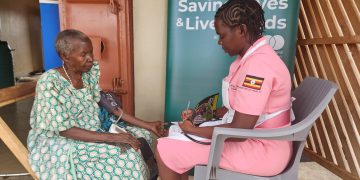The government has kicked off a nationwide registration of livestock farmers as it prepares to roll out Uganda’s first compulsory, bi-annual Foot-and-Mouth Disease (FMD) vaccination campaign in 2026.
The exercise, launched Tuesday at the Uganda Media Centre by State Minister for Agriculture Bright Rwamirama, marks a major shift from the previously reactive FMD control strategy to a structured national immunisation programme targeting all livestock-keeping households.
Rwamirama said the initiative is designed to protect the country’s 44.5 million livestock from the viral disease, which continues to disrupt livestock markets and undermine livelihoods in cattle-keeping districts.
The country’s animal population includes 11 million cattle, 17.4 million goats and 7.1 million pigs — all susceptible to FMD. More than 40 districts were hit by outbreaks last year, resulting in quarantines, reduced milk and meat production, and loss of income for farming communities.
“This programme is about securing livelihoods. FMD has been affecting millions of Ugandans who depend on livestock, and we are now taking a firm, organised approach to stop it,” Rwamirama said.
Shift to Mandatory, Bi-Annual Vaccination
Beginning January–February 2026, Uganda will administer FMD vaccines twice a year across the entire country. The government plans to procure around 88 million doses annually to achieve herd immunity.
For sustainability, a cost-sharing model has been adopted. Farmers will contribute Shs 8,000 per cow and Shs 4,000 per goat, sheep or pig. Government will fund logistics, including vaccinators, cold-chain systems and surveillance.
Payments will go into a dedicated recovery fund at Bank of Uganda through Post Bank and Housing Finance Bank to ensure continuous vaccine supply.
Farmer Registration Begins
The ongoing onboarding exercise requires livestock farmers to register once through district veterinary officers, working with partner banks. Farmers will receive a Unique Farmer Identifier (UFI) and select their preferred payment option — mobile money, bank deposit or agent banking.
Registration will help government track livestock numbers, allocate vaccines accurately and monitor compliance once the programme starts.
“This process gives us real-time livestock data and ensures vaccines reach those who need them. It also enforces accountability in the system,” Rwamirama noted.
Transforming Animal Health Policy
Previously, government interventions were sporadic and covered only a small fraction of the national herd, leaving several regions vulnerable to repeat outbreaks. Officials say the new system ends that pattern and lays the foundation for a predictable livestock health programme similar to human immunisation systems.
The ministry urged farmers to cooperate with district veterinary teams during registration, warning that unregistered farmers will not be eligible for vaccination under the new regime.
The mass registration exercise is ongoing nationwide.





















